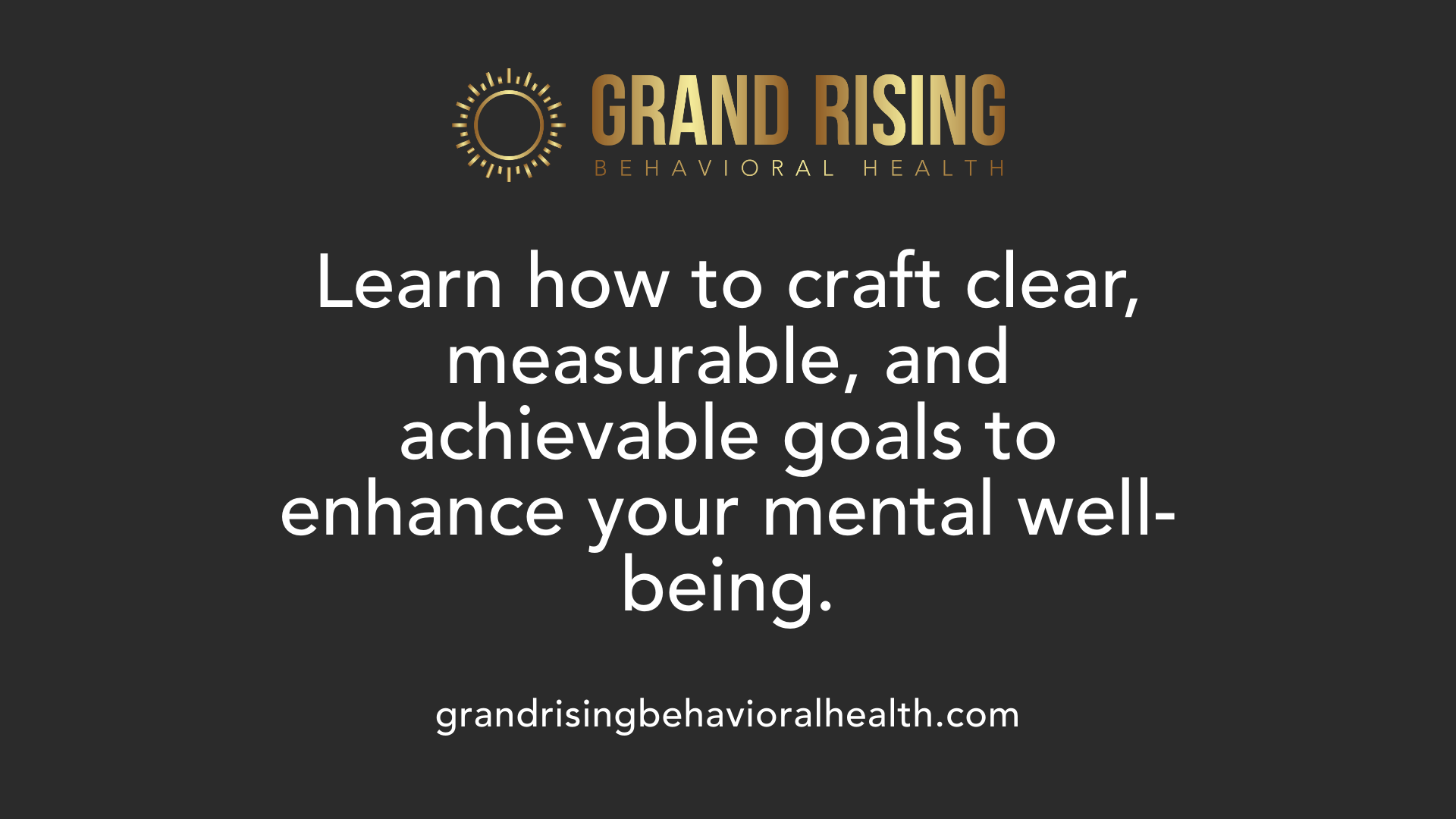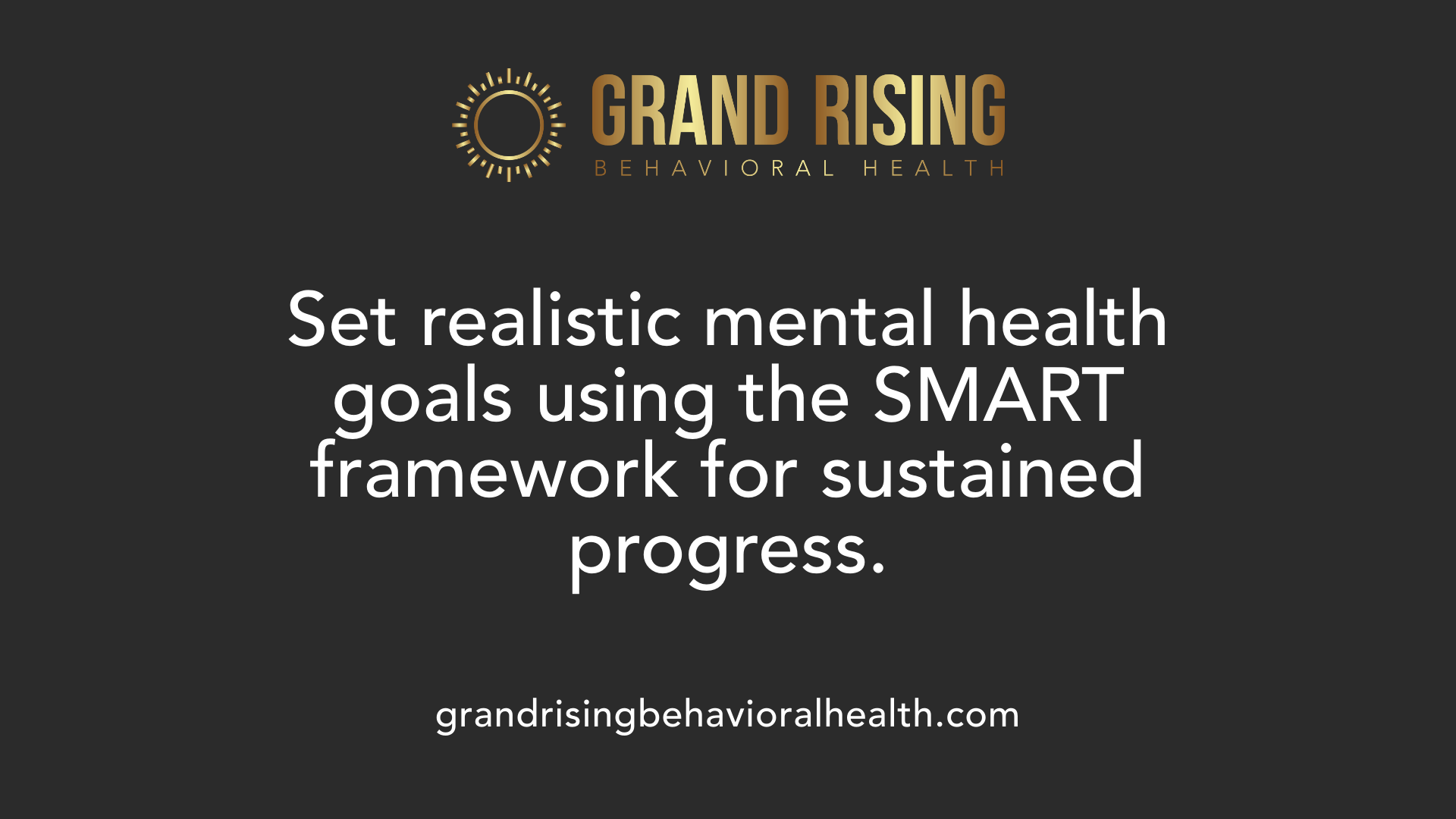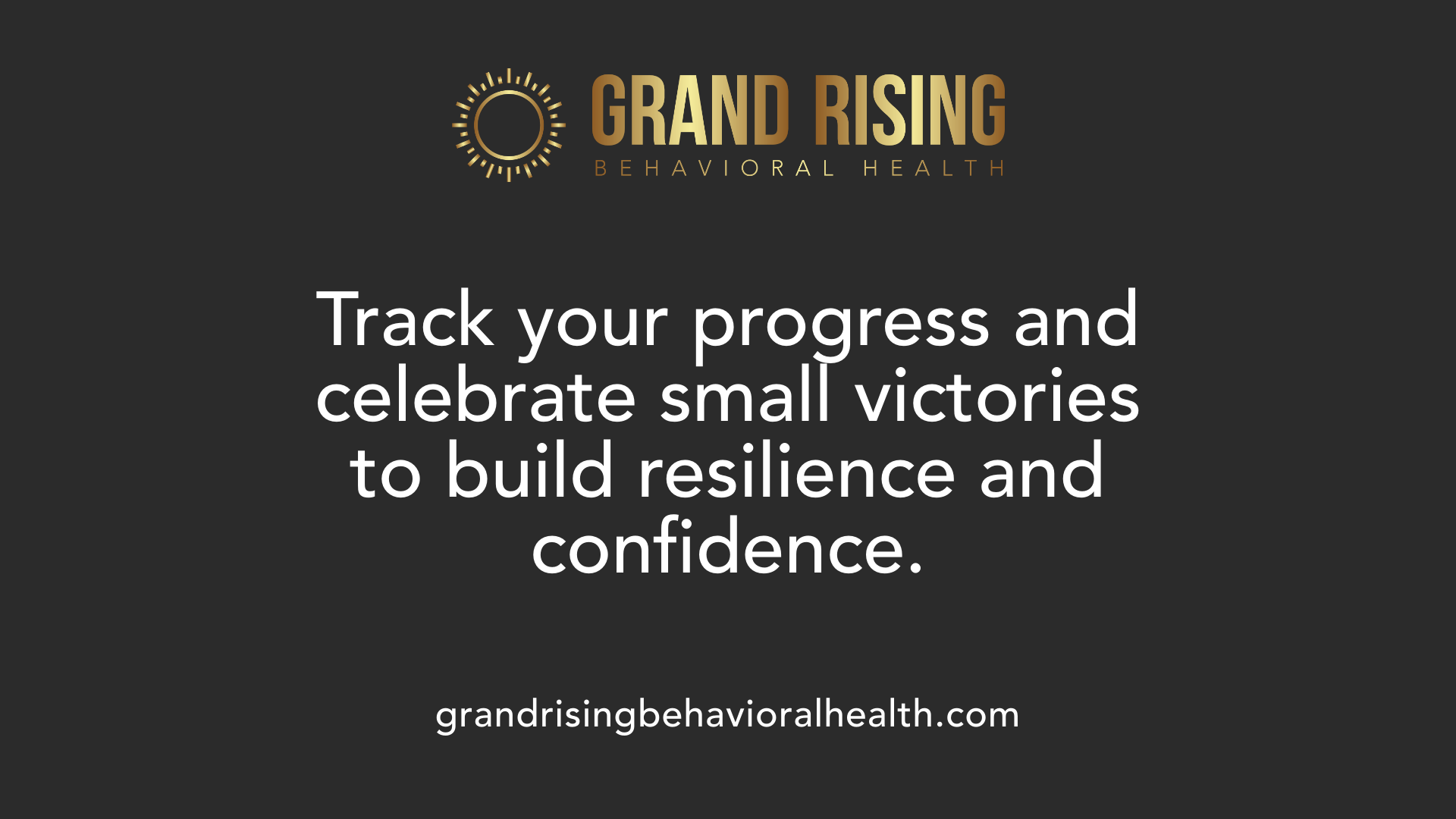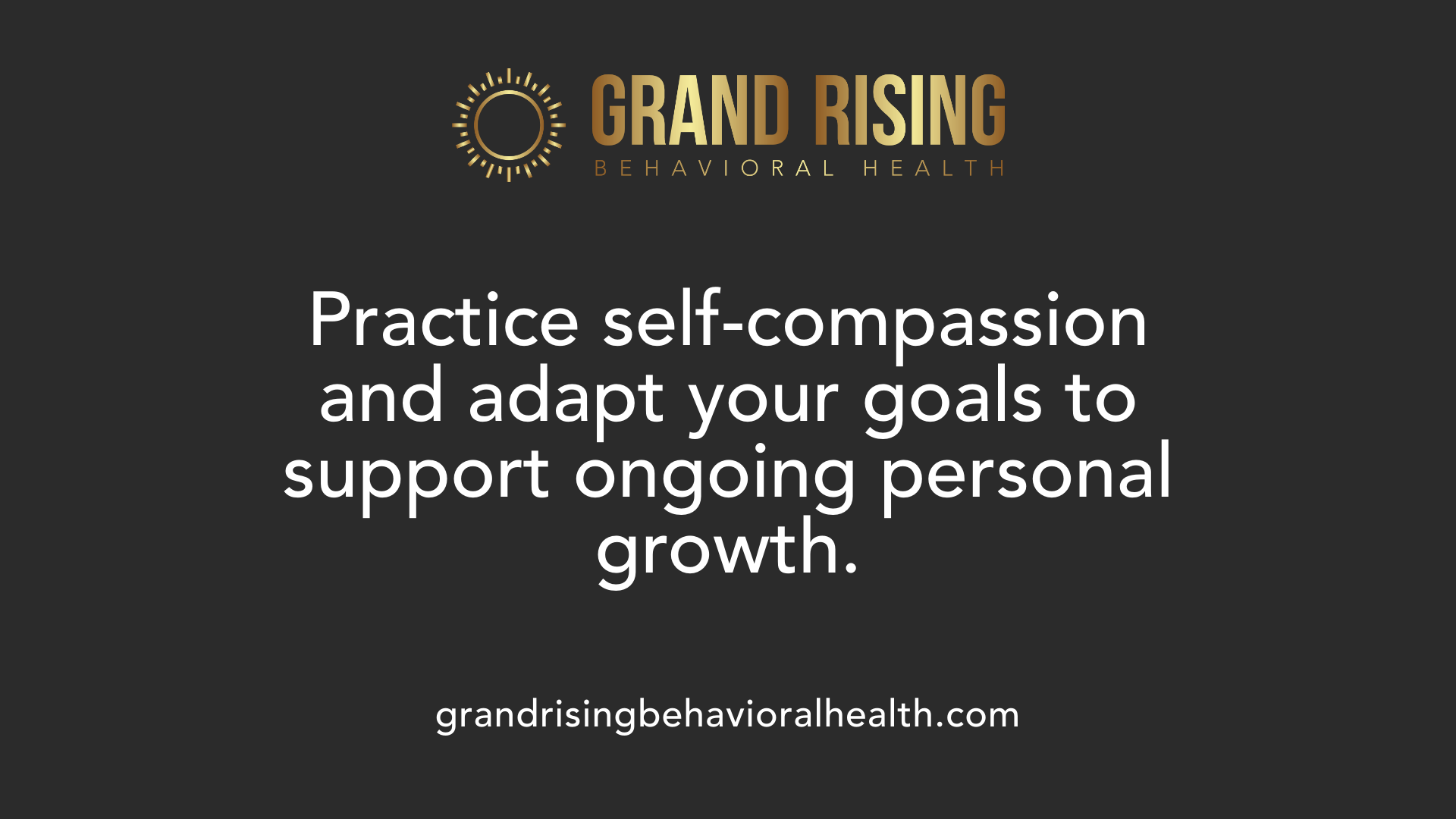How to set realistic mental health goals
Building a Strong Foundation for Your Mental Well-Being

Understanding the Importance of Setting Realistic Goals
Embarking on a journey to improve mental health begins with setting goals that are both meaningful and manageable. Realistic goals serve as a guiding compass, helping you navigate challenges, track progress, and celebrate achievements. This article offers a comprehensive guide on how to establish effective mental health goals, utilizing proven frameworks like SMART, and integrating strategies that foster resilience and personal growth.
The Significance of Mental Health Goals
Why is setting mental health goals important and what benefits can they provide?
Establishing mental health goals helps individuals create a clear path toward emotional well-being by defining specific, realistic objectives to work toward. This clarity reduces ambiguity and feelings of being overwhelmed, making progress feel accessible and manageable.
Setting goals actively encourages self-awareness and self-reflection. By identifying areas for growth—such as improving sleep hygiene, practicing mindfulness, or establishing healthy boundaries—people gain insight into their habits, triggers, and strengths.
Achieving these objectives can significantly enhance self-confidence and motivation. As individuals see tangible results from their efforts, they build resilience and a stronger sense of control over their mental health journey.
Moreover, mental health goals promote proactive self-care, such as dedicating time for relaxation, engaging in physical activity, or cultivating gratitude. These activities reinforce a positive mindset and create habits that support enduring well-being.
Creating goals that are both supportive and attainable helps prevent frustration and discouragement. Breaking larger aims into smaller, manageable steps increases the likelihood of success and fosters a sustainable approach.
Overall, setting mental health goals acts as a guiding compass, fostering emotional growth, resilience, and personal development. By systematically tracking progress and celebrating milestones, individuals can improve life satisfaction and strengthen relationships.
This goal-oriented approach also helps in addressing and challenging cognitive distortions—like catastrophizing or overgeneralization—that can sabotage mental health efforts. With consistent effort, individuals develop healthy coping strategies, bolster their sense of purpose, and create a supportive environment for ongoing mental wellness.
In summary, mental health goal setting not only provides direction and focus but also cultivates a resilient mindset, enabling individuals to navigate challenges more effectively and toward a more balanced, fulfilling life.
Adopting the SMART Framework for Effective Goal Setting

How can I use frameworks like SMART goals to improve my mental health?
Implementing structured goal-setting methods like the SMART framework can have a profound impact on mental health management. SMART stands for Specific, Measurable, Achievable, Relevant, and Time-bound, providing clear guidelines for setting effective goals.
Start by defining what exactly you want to achieve. For instance, instead of vague intentions like "reduce stress," a specific goal could be "practice deep breathing exercises for 10 minutes every morning." Next, ensure your goal is measurable; you can track progress by journaling or setting mini targets, such as completing five days in a row.
Setting achievable goals involves understanding your current capabilities to avoid overwhelm. For example, if you’re new to meditation, beginning with five minutes daily is realistic. Relevance is crucial—your goal should align with your mental health needs, like improving sleep or reducing anxiety.
Lastly, assign a deadline or timeframe, such as aiming to establish this routine over four weeks. This helps maintain focus and motivation.
Examples of SMART goals for mental health
| Goal | Description | SMART Criteria Met |
|---|---|---|
| Practice mindfulness meditation for 10 minutes daily for 4 weeks | Regular mindfulness practice to reduce stress and increase self-awareness | Specific, Measurable, Achievable, Relevant, Time-bound |
| Walk for 20 minutes three times a week for two months | Incorporates physical activity to boost mood and energy | Specific, Measurable, Achievable, Relevant, Time-bound |
| Reduce social media use to 30 minutes daily for one month | Limits screen time to improve focus and mental clarity | Specific, Measurable, Achievable, Relevant, Time-bound |
Using the SMART framework ensures your mental health goals are clear and attainable, which helps reduce frustration and increases the likelihood of success. Regularly revisiting and adjusting these goals keeps your mental wellness plan aligned with evolving needs and circumstances. This structured approach empowers you to take proactive steps towards emotional resilience and overall well-being.
Creating Practical and Achievable Goals

How can I set realistic and achievable mental health goals?
To craft goals that are within reach and truly beneficial, it's important to start with honest self-assessment. Reflect on your current mental health status, pinpoint specific areas that need improvement, and set intentions aligned with your well-being.
Using the SMART framework—Specific, Measurable, Achievable, Relevant, and Time-bound—helps guide this process. For example, instead of saying, "I want to be less anxious," a SMART goal would be, "Practice deep breathing exercises for 10 minutes every morning for the next month to reduce anxiety levels."
Breaking larger goals into smaller, manageable steps reduces the risk of feeling overwhelmed. For instance, if your aim is to improve sleep habits, start by establishing a regular bedtime, limiting screen time before sleep, and gradually increasing sleep duration.
Recognizing your personal abilities and external factors is also crucial. Be honest about your current routines, responsibilities, and support systems. If external factors like work commitments or family demands influence your capacity, adjust your goals accordingly.
Consistently tracking progress, whether through journaling or check-ins, enables you to see growth and stay motivated. Celebrating small successes along the way reinforces positive behavior and helps maintain momentum.
Furthermore, seeking guidance from mental health professionals or trusted support networks provides external encouragement and expert advice, increasing your chances of long-term success.
Ultimately, setting practical mental health goals involves a combination of self-awareness, strategic planning, and flexibility. When goals are realistic and tailored to your circumstances, they become powerful tools for fostering resilience and overall well-being.
Benefits of Journaling and Celebrating Milestones

How can I effectively track and manage my mental health goals?
Tracking and managing mental health goals effectively involves a combination of setting clear objectives and using tools that foster self-awareness and progress monitoring. Begin by defining goals based on the SMART framework—making sure they are specific, measurable, achievable, relevant, and time-bound. For example, instead of a vague goal like “feel less stressed,” a SMART goal could be “practice mindfulness meditation for 10 minutes every morning for two weeks.”
Using journals to record your feelings, daily activities, and progress is a powerful way to stay aware of your mental state. Writing consistently helps identify patterns, triggers, and improvements over time. You can also explore digital apps such as Bearable, Daylio, or Worry Watch, which are designed to help you log moods, activities, and achievements conveniently.
Breaking down large goals into smaller, manageable steps prevents overwhelm and boosts motivation. For example, if your aim is to improve sleep, your steps might include establishing a bedtime routine, limiting screen time in the evening, and tracking sleep quality.
Sharing your goals with trusted individuals like friends, family, or mental health professionals can provide accountability and much-needed encouragement. Regularly reviewing your journal entries or app logs allows you to celebrate milestones—no matter how small—which reinforces positive behaviors and progress.
Adjusting your goals based on your experiences and setbacks is crucial. Flexibility helps maintain motivation during challenging times. Ultimately, consistent tracking through journaling and celebrating achievements encourages resilience, builds confidence, and keeps you engaged in your mental health journey.
The Power of Self-Compassion and Flexibility

How do I align my mental health goals with my overall personal growth and wellbeing?
Aligning mental health goals with your personal growth involves a thoughtful and flexible approach. Begin by reflecting on the areas you wish to improve, such as managing emotions, building resilience, or establishing healthier routines. Use the SMART framework to set clear, measurable, and realistic goals that resonate with your core values and long-term aspirations.
It is important that these goals reflect your interests and are connected to your overall sense of purpose. For example, if fostering better relationships helps you feel more balanced, include goals like connecting with loved ones or practicing active listening.
Supporting this process with self-care activities—such as mindfulness, regular exercise, and nutritious habits—can enhance both mental health and personal growth. These practices nurture emotional well-being and create a strong foundation for ongoing development.
Seeking support from professionals, friends, or support groups is an effective way to stay motivated and accountable. Regularly reviewing your progress and being willing to adapt your goals as circumstances change ensures you stay on a sustainable path.
Crucially, practicing patience and showing compassion to yourself fosters resilience. Recognize that setbacks are part of growth, and adjusting your goals with kindness helps maintain motivation.
Ultimately, integrating your mental health strategies with your broader personal development supports a balanced, fulfilling life. This approach encourages not only emotional stability but also continuous self-improvement, reinforcing that mental health and personal growth go hand in hand for overall wellbeing.
Maintaining Motivation and Overcoming Barriers

What strategies and techniques can I use to create effective mental health goals?
Creating effective mental health goals involves a thoughtful approach that increases the chance of success and supports ongoing progress. One fundamental technique is to use the SMART framework, which emphasizes goals that are Specific, Measurable, Achievable, Relevant, and Time-bound. For example, instead of setting a vague goal like "feel better," a SMART goal could specify "practice mindfulness meditation for 10 minutes daily for the next month." Breaking larger goals into smaller, manageable steps helps avoid feeling overwhelmed and allows for steady progress.
In addition to goal-setting techniques, incorporating proven activities can boost mental wellness. Regular physical activity, such as a 30-minute walk three times a week, can greatly improve mood. Prioritizing good sleep hygiene—like maintaining consistent bedtimes and reducing screen time before sleep—can also have a positive impact. Engaging with social support systems, whether through connecting with friends or joining a support group, fosters accountability and emotional resilience.
Tracking progress is essential. Journaling thoughts and achievements enables self-awareness, highlights milestones, and offers motivation. Using apps designed for mental health or wellness can be convenient tools for monitoring and adjusting goals in real-time.
Seeking support from mental health professionals or support groups provides additional motivation and expert guidance. These resources can help tailor goals to individual needs and troubleshoot setbacks.
Practicing self-compassion is vital; celebrate small victories and understand that setbacks are part of the growth process. Viewing challenges as opportunities to learn allows for a resilient attitude that sustains motivation over the long term.
By combining structured goal-setting, evidence-based wellness activities, progress tracking, and support systems, you can stay motivated and navigate common barriers effectively. This proactive approach fosters lasting improvements in mental health, making your journey more manageable and rewarding.
Embracing Progress and Seeking Support
Achieving your mental health goals is a continuous journey that benefits greatly from patience, adaptability, and support. Regularly monitor your progress, celebrate small successes, and be honest about setbacks, viewing them as opportunities for learning. Building a support system—whether through friends, family, or mental health professionals—can provide the encouragement and accountability necessary to stay committed. Remember, progress over perfection is key; with consistent effort and self-compassion, you can foster meaningful improvements in your mental well-being and overall quality of life. Your well-being is worth the effort, and every small step moves you closer to a healthier, more resilient you.
References
- Mental Health Goals: Strategies for Success in the New Year
- How Setting Goals can Positively Impact our Mental Health
- How Setting Goals Can Positively Impact Our Mental Health
- Setting Realistic Hopes and Goals: A Guide to Balance and ...
- Mental health is... Setting goals | Health & Wellness Services
- Set Your Mental Wellness Goals: A Path to a Healthier Mind
- 10 Realistic Mental Health Goals for 2025
- Setting Realistic Mental Health Goals for the New Year
- Goal setting | healthdirect
- How to set your 2025 mental health new year's resolutions
More Resources
A team ready to start your journey.
Get in touch — today.
We are a safe space – a haven for exceptional individuals to receive discreet, personalized, in-person treatment and care.
.avif)










